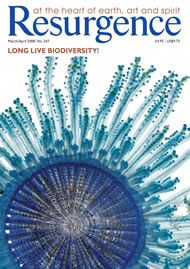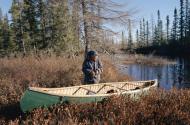ON CANADA’S EASTERN shore, the formerly nomadic Innu of Labrador are facing destruction. Their homeland is called Nitassinan, a vast area of slow-growth boreal forests the size of Britain, and it is rich with caribou, bear, beaver, otter and porcupine. In the past generation, the 2,000 Innu living here have been settled into villages in the name of progress. Now they are mostly disconnected from their traditional lifestyle. Today, as a result, alcoholism is widespread, life expectancy is low, and diabetes affects more than half the population.
What has gone so wrong? When Innu look at the country, they see places with stories; they see ancestors and animal spirits wandering the land; they see past and present intimately linked. But when civilisation marched north, it saw only the economic value of timber, of reservoirs for hydro-electricity, and of nickel in the rocks. For outsiders, opportunities for exploitation abound, and they have been grasped.
One evening, having spent the day in a canvas tent sheltering from torrential rain on Lake Melville’s shore, lying on sweet spruce boughs and sharing stories across a glowing stove, we decide to set out up-river in search of a birch-bark canoe built by Joseph and his friends three years ago. We moor the boat, and push through low willow scrub, splashing across the marsh, past the piercing blue of the flag irises, accompanied by a mist of blackfly and midges. The ground dries as we climb, and the scrub gives way to humid silver-birch and spruce forest. Pushing through the trees, we come upon an empty glade carpeted with the white stars of the frog-flower. There is no canoe. We stand in silence, looking emptily at the place where it should be. We can see the signs: three wooden posts in the ground for props, stumps of branches cut for tent poles, a space where tents have been pitched, the stripped bark of birch used for snowshoes, an otter skull hung from a branch in respect. We sense something deeply significant about this place, an underlying rhythm, and we catch our breath.
Joseph tells us how the canoe was built over the summer; how a vibrant community of twenty families had lived there. Here were the tents, and over there was the canoe. The place is full of stories. Yet, some time later, someone walked into this glade and, finding the canoe, made off with it. We walk out of the trees and, there, by the water’s edge, is a settler’s new summer cabin, complete with boardwalk, barbecue, solar panels and piles of hewn logs.
This land is officially designated by law for Innu use alone – yet people are claiming this new frontier for their own. Joseph says, “This is our land,” yet he seems to show no animosity. Perhaps he knows it is all too late. We wonder what these people did with the canoe. We also speculate about what they think when they stand here, barbecuing a steak flown in from a distant factory farm. We walk back along the shore, and cast off into the wide brown river, through the treacherous shallows and into the lake proper to check the salmon nets. The dusk draws in, and the wind whips the white tops off the waves. The water is unforgiving, slapping hard on the boat. Perhaps this lake is telling us to beware – for here we have seen a snapshot of frontier history, and its resulting disconnectedness and despair.








